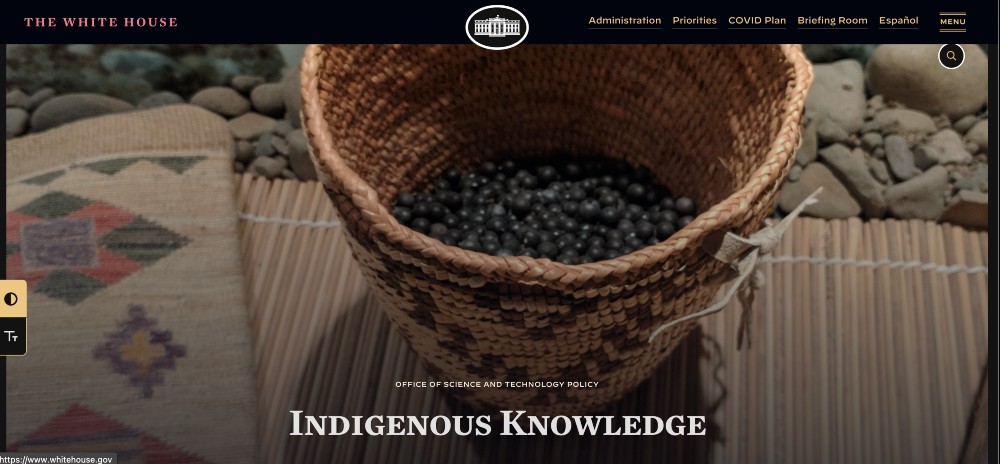
- Details
- By Jenna Kunze
The White House Council on Native American Affairs on Monday, July 18, held its third engagement session to hear from tribal leaders on the protection of sacred sites and treaty rights.
The meeting was led by Secretary of the Interior Deb Haaland, who co-chairs the council with White House Domestic Policy Advisor Ambassador Susan Rice.
The aim of the engagement sessions, which began in January 2022, was to fulfill Haaland’s commitment to convene her cabinet three times a year to hear from tribal leaders and share the work of the White House Council on Native American Affairs.
Also present in Monday’s meeting were Secretary of Agriculture Tom Vilsack, Senior Advisor and Assistant to the President and the Director of the White House Office of Intergovernmental Affairs Julie Chavez Rodriguez, EPA Deputy Administrator Janet McCabe, and Department of the Interior Assistant Secretary for Indian Affairs Bryan Newland.
Today’s session addressed the impacts of climate change in Indigenous communities, the implementation of the Indigenous Traditional Ecological Knowledge Memorandum that commits to elevating Indigenous Traditional Ecological Knowledge in federal scientific and policy processes, and the Office of Science and Technology Policy’s new Indigenous Knowledge website, according to a press release from the Department of the Interior.
More Stories Like This
Native News Weekly (August 25, 2024): D.C. BriefsUS Presidents in Their Own Words Concerning American Indians
Native News Online Launches Year-End Campaign to Support ‘Warrior Journalism’
Native News Online’s Year-End Live Stream - Recap of 2025: A Night That Brings Indian Country Together
GivingTuesday: Groups Making a Real Impact in Indian Country
Help us tell the stories that could save Native languages and food traditions
At a critical moment for Indian Country, Native News Online is embarking on our most ambitious reporting project yet: "Cultivating Culture," a three-year investigation into two forces shaping Native community survival—food sovereignty and language revitalization.
The devastating impact of COVID-19 accelerated the loss of Native elders and with them, irreplaceable cultural knowledge. Yet across tribal communities, innovative leaders are fighting back, reclaiming traditional food systems and breathing new life into Native languages. These aren't just cultural preservation efforts—they're powerful pathways to community health, healing, and resilience.
Our dedicated reporting team will spend three years documenting these stories through on-the-ground reporting in 18 tribal communities, producing over 200 in-depth stories, 18 podcast episodes, and multimedia content that amplifies Indigenous voices. We'll show policymakers, funders, and allies how cultural restoration directly impacts physical and mental wellness while celebrating successful models of sovereignty and self-determination.
This isn't corporate media parachuting into Indian Country for a quick story. This is sustained, relationship-based journalism by Native reporters who understand these communities. It's "Warrior Journalism"—fearless reporting that serves the 5.5 million readers who depend on us for news that mainstream media often ignores.
We need your help right now. While we've secured partial funding, we're still $450,000 short of our three-year budget. Our immediate goal is $25,000 this month to keep this critical work moving forward—funding reporter salaries, travel to remote communities, photography, and the deep reporting these stories deserve.
Every dollar directly supports Indigenous journalists telling Indigenous stories. Whether it's $5 or $50, your contribution ensures these vital narratives of resilience, innovation, and hope don't disappear into silence.
 The stakes couldn't be higher. Native languages are being lost at an alarming rate. Food insecurity plagues many tribal communities. But solutions are emerging, and these stories need to be told.
The stakes couldn't be higher. Native languages are being lost at an alarming rate. Food insecurity plagues many tribal communities. But solutions are emerging, and these stories need to be told.
Support independent Native journalism. Fund the stories that matter.
Levi Rickert (Potawatomi), Editor & Publisher

